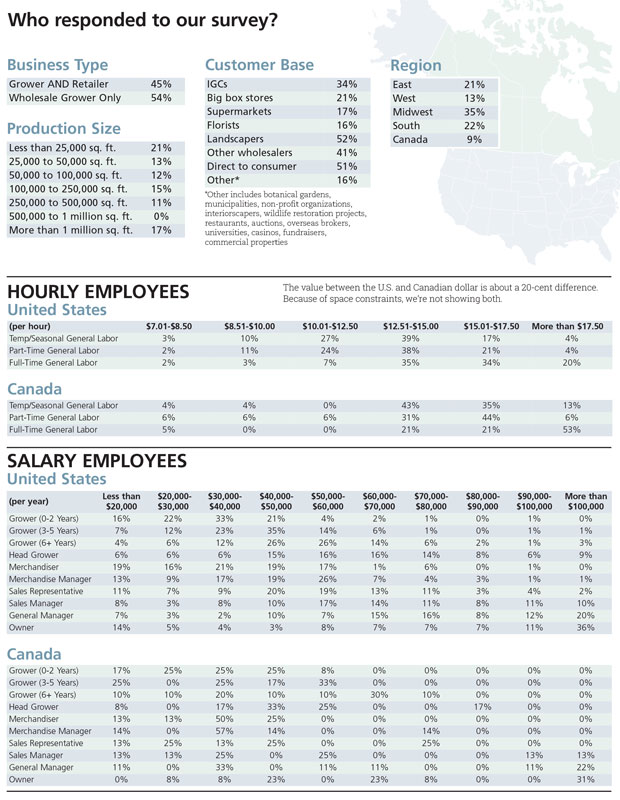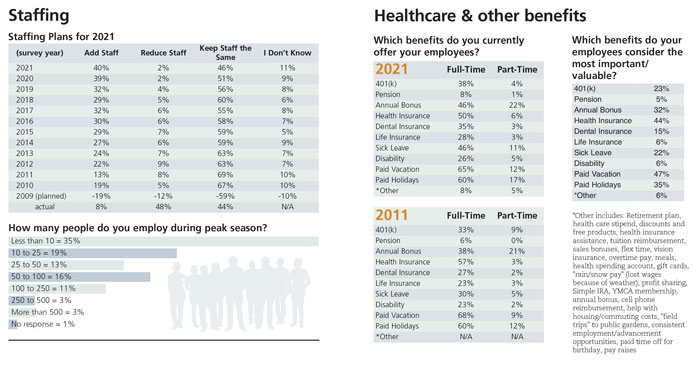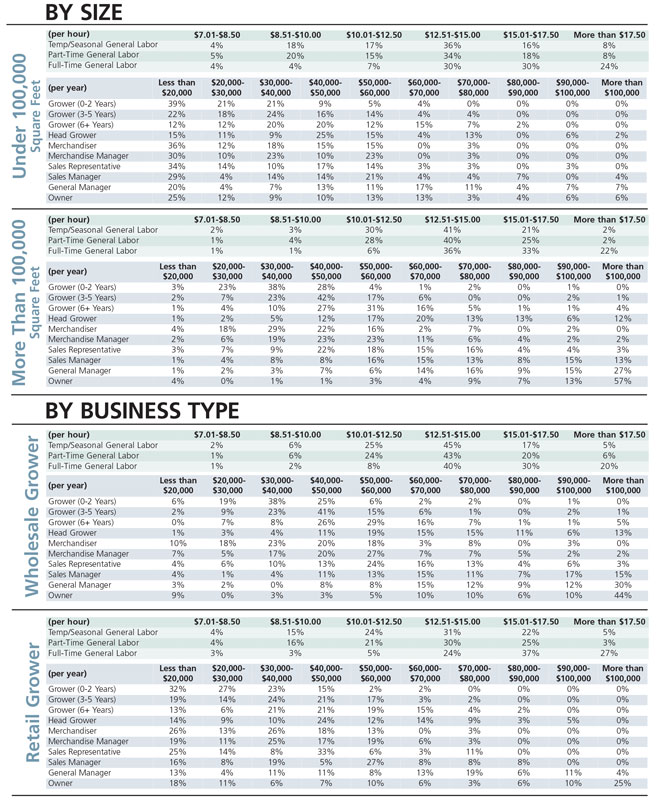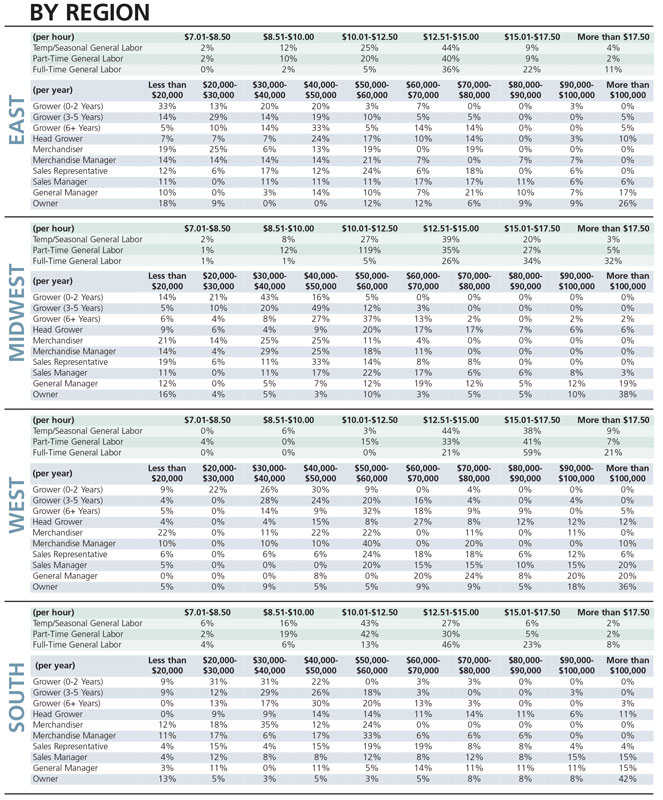12/1/2021
Wages—Up!
Jennifer Zurko

Salaried employees’ wages seem to be more evenly spread out than in previous years, but the big story is that hourly wages for seasonal general labor have noticeably increased. Growers are paying their full-time labor pretty much the same as last year, but pay for part-time and seasonal/temporary labor has gone up. Last year, only 8% of growers under 100,000 sq. ft. paid temp labor $15.01 to $17.50 an hour. This year, it’s at 15%. None paid more than $17.50 for temp labor last year; this year, it’s 7%.
Larger growers (over 100,000 sq. ft.) are paying more for their seasonal/temp labor, too. Twenty percent are paying between $15.01 to $17.50 this year compared to 8% last year. And 21% of them are paying their part-time workers up to $17.50—that was 8% last year, too.
According to our survey data this year, businesses that are paying more for seasonal and part-time labor have increased across the board. Regardless of whether you’re a wholesale-only operation or a grower-retailer, most of you have increased pay for labor needed during peak busy times.
The most significant increase we saw for part-time and temp labor is in the Midwest and the West, where growers who indicated they were paying between $15.01 and $17.50 went up—some by quite a bit (last year, 9% of growers in the West paid this rate; this year it’s 34%).
I hypothesize two reasons for this: 1) a lot of states in the Midwest and West have since enacted $15 minimum wage laws; and 2) these states have a ton of competition for seasonal labor, so they have to pay more in order to have access to the pool.
Which brings me to a quick “research project” (meaning I sifted through a bunch of online resources) I conducted just to get a brief glimpse into what other industries are paying their workers. We’re hearing from operations everywhere that the competition for workers is increasing while the available pool of talent is decreasing. A nursery in Oregon told me this past summer that they lost 17 workers in one week to the new Columbia apparel distribution warehouse nearby.
Here are the pay scales of other industries I found (my sources were Salary.com, ZipRecruiter.com and Talent.com):
• Construction: $35,000 to $45,000
• Warehouse: Median salary is about $33,000, with the low percentile at about $24,000 and the high at $42,000. Depends on the state, but the top five states are Washington ($30,876), Maryland ($30,483), Nebraska ($29,848), Virginia ($29,456) and New York ($29,421). The lowest five states are North Carolina ($20,093), Illinois ($21,934), Mississippi ($22,001), Michigan ($22,044) and Arkansas ($22,054).
• Food packaging: Median is $27,300, with the low percentile at $23,400 and the high at $33,100. The top five states that offer the highest pay are Arkansas, Delaware, California, Washington and New Jersey.
• Farm (field ag, dairy, etc.): Median is $30,287, with the low percentile at $13,000 and the high at $51,500. The top five states that offer the highest pay are Washington ($33,261), Maryland ($32,699), Nebraska ($32,030), New York ($31,860) and Virginia ($31,610). The lowest five states are Illinois ($23,894), Mississippi ($23,935), Arkansas ($24,024), Florida ($24,344) and Kentucky ($24,454).
So how can we attract new employees and how do we keep them coming back? That’s the million-dollar question, isn’t it? And one that some haven’t figured out yet.
But the businesses in our industry are known for their creative thinking, so we wanted to see if they’ve come up with anything different to bring in a more stable workforce. This year’s open-ended essay question was: What creative incentives have worked for attracting and/or keeping good employees?
Flexible work schedules were by far the most mentioned. Many survey respondents said that they offer their employees a way to work around their family needs—like when childcare is available, allowing them to leave to watch their kid in the game/play, or take time to address medical needs. Bonuses were another way a lot of growers are retaining their employees.
Another response that I thought was interesting is that a lot of people also said a friendly or fun work environment was an added perk that they offer their employees. Quite a few people said they really focus on treating their staff like family. And, although the work is hard, they try to keep the mood light. One such grower in Florida said, “We laugh a lot and get a surprising amount of work done.”
Some other comments:
“Make work enjoyable and fun! Pay will get a new person in the door, but will not keep them. You have to create a drama-free environment that people get up and look forward to coming to work each day. Squash drama people even if you feel they are important to your crew (this was my most costly lesson over the years).” —Iowa
“We are competing with all the retail service industry jobs that most university students end up in. It's not creative, but we pay more and provide consistent full-time hours with a fixed schedule for the entire season. We also attempt to train each employee on all the aspects of the business, so the work is more varied and they gain a variety of experiences.” —Ontario
“We offer flexibility and compassion to our employees, and this seems to be worth more than other, more expensive, benefits.” —Manitoba
“I offer to let the employee create their own schedule around their children’s needs and household responsibilities. This has worked well—especially for the women I employ.” —Florida
“Mommy hours: 9:00 a.m. to 3:00 p.m. so that moms can work while kids are in school. It’s a good seasonal gig to provide a family with a little boost to the budget.” —Iowa
“Developing a company culture that recognizes individuals as people rather than [part of a] head count.” —Illinois
Incentives mentioned to attract/keep employees included:
• Flexible work schedule
• Bringing in lunch
• Use of company equipment
• Free plants
• Referral bonuses
• Mentoring program
• Surprise “treats” (doesn’t have to be food)
• Free coffee
• Option to take more time off during the off-season
• Tuition reimbursement
• Input on production lineup
• Lottery tickets with your paycheck
• No dock in pay for personal time off
• Cross-training to learn other aspects of the business
• Employee outings/field trips
• Competitive pay
• Rewards for good attendance
• Allowed to bring in your (well-behaved) dogs
• Pay raise with certain benchmarks
• Profit sharing
• Housing
Candidate Suggestions
By Bob Zahra
Here are a few suggestions for candidates as our industry enters into what we hope will be a post- pandemic phase. There are obviously innumerable employment opportunities, not only in the traditional sectors, but in new and expanding industry niches.
• Be on guard against complacency. It can appear as if opportunities are limitless and will go on forever, and there’s no need to act quickly. But this is probably a cyclical phase and the wise move may be to seize the opportunity, especially in an industry whose very best jobs fill quickly and may be filled for decades before reopening.
• Keep in mind some wise advice. Yogi Bear is “smarter than the average bear.” Rudyard Kipling advised to “keep your head when all about you are losing theirs.” Be decent. Be respectful. Be multi-media, not just text alone. Return phone calls and emails. Don’t disappear. Zoom. Teams. Volunteer for the hard job. It’s the person that works hard and smart who gets noticed. Stay late when it’s smart to stay late. If you want to break out of the pack, do what you say you’re going to do. To get ahead, consider working at least part of Saturday.
• Need a role model? How about Queen Elizabeth II? Gets up every day and goes to work. During World War II, over the strenuous objections of her family, a young Elizabeth Windsor enlisted in the ATS, where she learned to deconstruct, repair and rebuild engines. Her WWII contribution is treasured. At least as of this writing, Queen Elizabeth still gets up every day and goes to work.
• Find yourself drifting into mindless, social media chatter? Remember the words of P. J. O’Rourke: “Whose bright idea was it to put every idiot in the world in touch with every other idiot?”
• Cheerfulness doesn’t come easily to everyone, but it’s a choice. Not unlike a positive attitude. In many cases, you can choose your reaction to the day’s events—you can WILL your reaction to the day’s events.
We live in a time where it’s easier to sell a house than to buy a house and we live in a society that rewards prudent risk. In the world of career advancement, if one is risk-averse, it’s easier to do nothing and to endure the consequences. Much is said about remembering to be fair to your current employer and to any future employer, but don’t forget to be fair to yourself and to your family, and to take care of your career in the same way you attend to your health. GT
Bob Zahra is an executive search consultant with Florasearch, Inc., a certified personnel consultant, and past chair of the National Association of Executive Recruiters. He can be reached at (407) 320-8177 or bzahra@florasearch.com.



